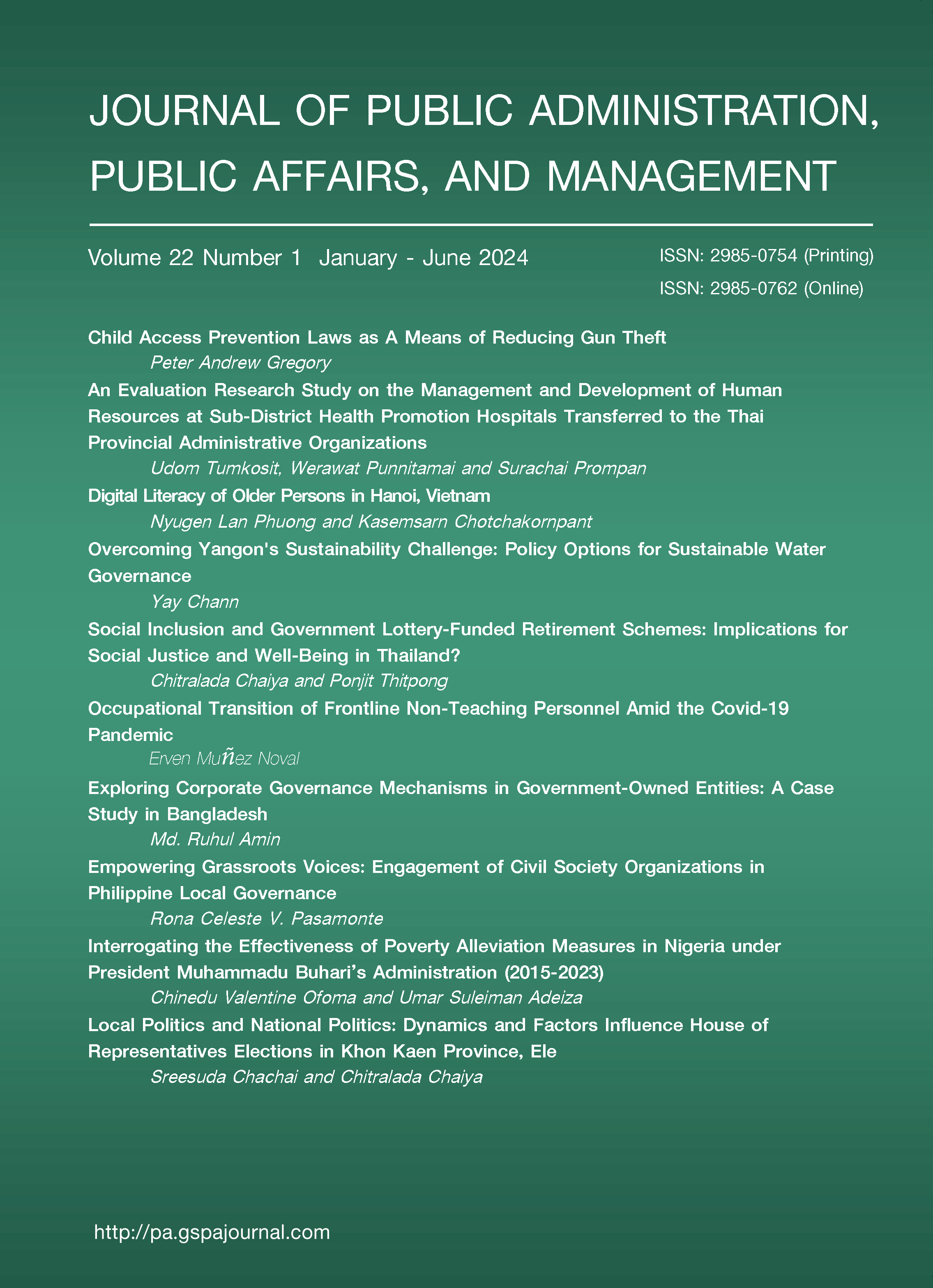Social Inclusion and Government Lottery-Funded Retirement Schemes: Implications for Social Justice and Well-Being in Thailand?
Keywords:
Government lottery, retirement schemes, decision-making, purchasing behavior, elder welfareAbstract
This research examines the impact of government lottery-funded retirement schemes on social justice and well-being in the Kalasin Province, Thailand, by investigating citizens' purchasing behaviors regarding lottery tickets for retirement benefits. This study aims to answer the following research question: How do gambling, buyers’ behavior, and decision-making factors relate to each other? As the new pilot pension scheme has not been implemented yet, this study focuses on lottery purchasing behavior as the baseline for the feasibility study of the new policy. Employing a mixed-method approach, we analyzed data from 400 quantitative participants through structured questionnaires and conducted 10 qualitative interviews using thematic analysis. Our findings reveal a notable incongruity: while quantitative data indicate a decline in ticket purchases, qualitative insights demonstrate consistent buying patterns, influenced by personal beliefs, familial obligations, and welfare considerations. The study identifies key factors such as fairness of the policy, perceived investment value, and potential interest returns as significant influences on purchasing decisions. These findings underscore the importance of refining the policy framework to enhance its contributions to social justice and well-being. Recommendations include diversifying marketing strategies, implementing affordable ticket pricing, and ensuring clear information dissemination. Future research endeavors may expand upon this analysis or explore alternative retirement funding models, thereby offering additional insights for social welfare policy reforms.
References
Buracom, P. (2016). The distributional effects of social spending in Thailand: Evidence from a new database. Asian Social Policy and Poverty, 22(4). https://doi.org/10.1111/ASPP.12245
Center for Gambling Studies. (2016). Gambling in a Transitional Era: Annual Report 2016. Bangkok: Center for Gambling Studies.
Chalamwong, Y., & Meepien, J. (2012). Poverty and just social protection in Thailand. Asian Economic Journal, 29(3). https://doi.org/10.1355/AE29-3E
Chanarupha, P. (2007). Public Perception of Transparency in the Government Lottery Process. Unpublished Master's Thesis, Rajabhat Phranakhon University, Bangkok.
Chanwet, S. (2013). Factors Affecting the Decision to Choose Pension of Fund Members. Government Pension (GPF): Case Study of Secondary Education Service Area Office 31, Nakhon Ratchasima Province. Pathum Thani, Thailand: Rajamangala University of Technology Thanyaburi.
Government Lottery Office. (2019). Qualifications of Sales Representatives. Retrieved from https://www.glo.or.th/mission/distribution/selling-qualification.
Government Lottery Office. (2022). History and Development of the Thai Lottery. Retrieved from https://royalthai.tv/static/history.
Government of Thailand. (2022). Ministry News on the Economy. Retrieved from https://www.thaigov.go.th/news/contents/details/57060.
Guest, G., Bunce, A., & Johnson, L. (2006). How Many Interviews Are Enough? An Experiment with Data Saturation and Variability. Field Methods, 18(1), 59-82. https://doi.org/10.1177/1525822X0527990
Jitsuchon, S. (2012). Universal social welfare system: what Thai people deserve. Thailand Development Research Institute. Retrieved from https://tdri.or.th/2012/12/social-security/.
Kalasin Provincial Office. (2017). History of Kalasin Province. Retrieved from https://www.kalasin.go.th/t/index.php/th/2017-10-02-18-25-55/2017-10-02-18-40-51.html.
Khamhom, R. (2010). Legal Measures Related to the Sale of Government Lottery by Foreign and Thai Lottery Retailers. Retrieved from http://dspace.spu.ac.th/bitstream/123456789/7872/8/%E0%B8%9A%E0%B8%97%E0%B8%97%E0%B8%B5%E0%B9%88%203%20%28Final%29.pdf.
Kositthamjit, J. (2019). Government lotteries in China and the attraction to people, like floating water chestnut is in the tax system. The Cloud. Retrieved from https://readthecloud.co/chinese-lotto/.
Krejcie, R. V., & Morgan, D. W. (1970). Determining sample size for research activities. Educational and Psychological Measurement, 30(3), 607–610. https://doi.org/10.1177/001316447003000308
National Economic and Social Development Council. (2021). The 13th National Economic and Social Development Plan. Retrieved from https://www.nesdc.go.th/article_attach/article_file_20230615134223.pdf.
National Economic and Social Development Council. (2024). National Economic and Social Development Council Report. Bangkok: Author.
National Statistical Office, & Office of the National Economic and Social Development Council. (2024). Data from the Household Economic and Social Survey. Retrieved from https://www.nesdc.go.th/ewt_dl_link.
Noknoi, J. (2017). Organizational Behavior. Bangkok: Chulalongkorn University.
Office of the Civil Service Commission. (2011). Lottery. Retrieved from https://dictionary.orst.go.th/.
Office of the Council of State. (2012). Royal Decree on Retirement Compensation for Civil Servants B.E. 2533. Retrieved from https://www.krisdika.go.th/librarian/get?sysid=300760&ext=pdf.
Office of Social Policy and Innovation Development. (2021). Report on Significant Social Movements. Retrieved from https://opendata.nesdc.go.th/dataset/3d52c7fd-b4d1-4040-aeaa-903639fc854c/resource/5f575779-78dd-4b0e-b41a-f3f79c6344bb/download/5.-..pdf.
Organization for Economic Co-operation and Development. (2019). Pensions at a Glance 2019: OECD and G20 Indicators. Retrieved from https://www.oecd.org/daf/oecd-pensions-at-a-glance-19991363.htm.
Riangmai, B. (2013). Gambling Behavior and Saving Behavior that Predict Perceptions: Quality of Life of Employees Operating Community Waste Management Business and Infectious Waste. Unpublished master’s thesis, King Mongkut's University of Technology North Bangkok, Bangkok.
Royal Institute of Thailand. (2011). The Description of Thai Lottery. Bangkok: Author.
Sudsomboon, S. (2014). Social welfare of aging people in Thailand. Journal of Southern Technology, 7(1), 73-82.
Suthi, J. (2019). The relationship of personal and social factors affecting behaviors towards lottery gambling and analysis of a feasibility study to change lottery expenses to be long term personal savings for undergraduate students in Pathum Thani Province. Research and Development Journal SuanSunandha Rajabhat University, 11(2).
Suwan, P. (1983). Measuring Attitude Change and Health Behavior. Bangkok: Peerapathana Publishing House.
Thailand Development Research Institute. (2015). TDRI Points Out that 73% of Thai People of Working Age Do not Have Income Security – Proposes Setting Up a Pension Committee – National Pension Connecting Savings. Retrieved from https://tdri.or.th/2015/04/20150427-2/.
Thailand Development Research Institute. (2023). "Welfare is not a Handout": TDRI Proposes a New World Welfare, Focusing on People as the Center and Encouraging Private and Social Sectors' Participation. Retrieved from https://tdri.or.th/2021/11/social-protection-annual-con-2021/.
Thongsuk, W. (2022). Consumer Behavior, Why is It Important? Why Brands Need to Deeply Understand It. Retrieved from https://talkatalka.com/blog/consumer-behavior/.
Ueychai, S. (2013). Factors Related to Consumer Decision-Making Behavior in Purchasing Government Lottery Tickets, Muang District, Nakhon Pathom Province. Unpublished Master’s Thesis, Silpakorn University, Bangkok.
Vorasittha, P. (2018). An evaluation of the possibility in reshaping lottery money to long-term savings for the poor in Outer Bangkok, Thailand. NIDA Development Journal, 58(1), 75-102.
World Bank. (2020). The Global Economic Outlook During the COVID-19 Pandemic: A Changed World. Retrieved from https://www.worldbank.org/en/news/feature/2020/06/08/the-global-economic-outlook-during-the-covid-19-pandemic-a-changed-world.
Downloads
Published
How to Cite
Issue
Section
License

This work is licensed under a Creative Commons Attribution-NonCommercial-NoDerivatives 4.0 International License.



